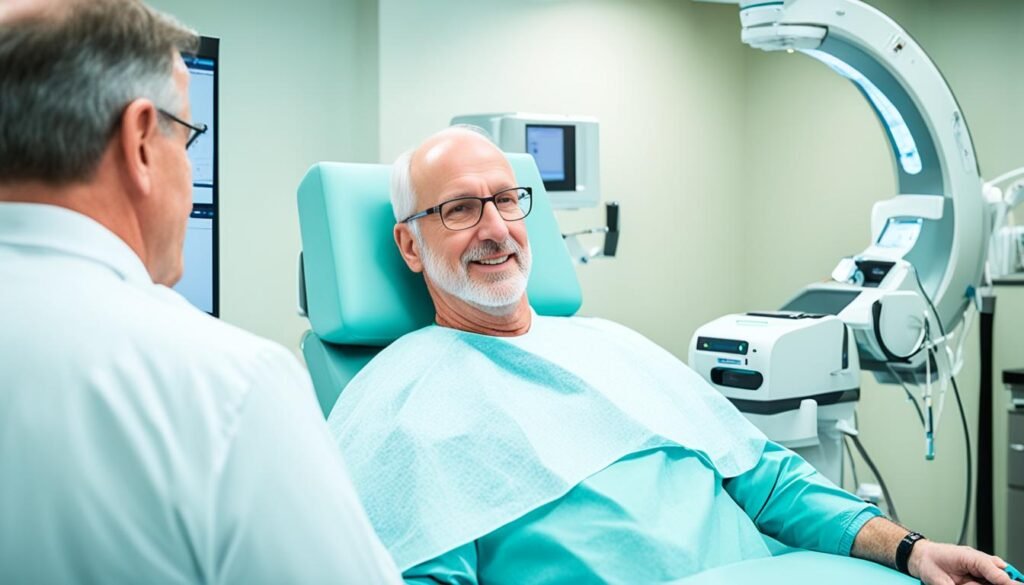Bowel cancer, also known as colorectal cancer, is a common and potentially life-threatening condition that affects the large bowel. It is crucial to be aware of the signs and symptoms of bowel cancer to ensure early detection and timely medical intervention. This section will guide you on recognizing bowel cancer and understanding its symptoms.
Table of Contents
ToggleWhen it comes to bowel cancer, recognizing the signs early on can make all the difference in your health outcomes. Some common symptoms of colorectal cancer may include:
- Change in bowel habits, such as persistent diarrhea or constipation.
- Rectal bleeding or blood in the stool.
- Ongoing discomfort or pain in the abdominal area.
- A feeling of incomplete bowel movement.
- Weakness or tiredness.
- Unexplained weight loss.
If you experience any of these symptoms persistently, it is essential to consult a healthcare professional. While these signs do not necessarily indicate bowel cancer, they should not be ignored. Early detection and treatment are key to improving outcomes and increasing the chances of successful recovery.
Risk Factors for Bowel Cancer
The exact cause of bowel cancer is still unknown, but there are several risk factors that have been identified. These risk factors can increase the likelihood of developing bowel cancer and should be taken into consideration.
- Advancing age: Most cases of bowel cancer occur in individuals over the age of 60.
- Personal or family history: Individuals with a personal or family history of colorectal cancer or polyps are at a higher risk.
- Inflammatory bowel diseases: Conditions such as ulcerative colitis or Crohn’s disease can increase the risk of developing bowel cancer.
- Inherited syndromes: Certain inherited syndromes like familial adenomatous polyposis and Lynch syndrome can heighten the risk.
- Diet and lifestyle: A low-fiber, high-fat diet, sedentary lifestyle, diabetes, obesity, smoking, and excessive alcohol consumption are all risk factors.
- Previous radiation therapy: Individuals who have undergone radiation therapy for cancer in the past may have an increased risk of developing bowel cancer.
It is important to note that having one or more of these risk factors does not guarantee the development of bowel cancer. However, being aware of these risk factors can help individuals take appropriate preventive measures.
Preventive Measures
To reduce the risk of developing bowel cancer, it is recommended to:
- Adopt a healthy lifestyle with a balanced diet rich in fiber, fruits, and vegetables.
- Maintain a healthy weight through regular exercise and physical activity.
- Avoid smoking and excessive alcohol consumption.
- Undergo regular screenings and follow the recommended screening guidelines based on age and risk factors.
- Discuss any family history of colorectal cancer or polyps with a healthcare professional.
By understanding the risk factors and taking preventive measures, you can reduce the risk of developing bowel cancer and promote overall well-being.
| Age | Personal or Family History | Inflammatory Bowel Diseases | Inherited Syndromes | Diet and Lifestyle | Previous Radiation Therapy |
|---|---|---|---|---|---|
| Advancing age increases the risk. | A personal or family history of colorectal cancer or polyps increases the risk. | Conditions like ulcerative colitis or Crohn’s disease increase the risk. | Certain inherited syndromes like familial adenomatous polyposis and Lynch syndrome increase the risk. | A low-fiber, high-fat diet, sedentary lifestyle, diabetes, obesity, smoking, and excessive alcohol consumption increase the risk. | Previous radiation therapy for cancer increases the risk. |
Diagnosing Bowel Cancer
If you experience symptoms that could be indicative of bowel cancer or have risk factors that warrant further investigation, your healthcare professional will likely recommend additional testing. These tests may include:
- Physical examination: Your healthcare professional will check for any lumps or abnormalities in your abdomen.
- Digital rectal exam (DRE): This exam assesses the rectal area for any signs of abnormalities or tumors.
- Colonoscopy: A colonoscopy is a procedure that allows your doctor to examine the inside of your colon and rectum for any abnormal growths or tumors.
- Biopsy: If any abnormal growths or tumors are discovered during a colonoscopy, your doctor may perform a biopsy to obtain a sample of tissue for further analysis in a laboratory.
- CT scan or MRI: These imaging tests help determine the extent of the cancer and whether it has spread to other parts of the body.
- Blood tests: Blood tests may be conducted to assess for any abnormalities or markers of cancer.
Proper diagnosis is crucial in determining the best course of treatment for bowel cancer.

Treating Bowel Cancer
Treatment options for bowel cancer depend on various factors such as the type and stage of the cancer, as well as your overall health and preferences. The main treatment modalities for bowel cancer include:
- Surgery: This involves removing the affected section of the bowel to eliminate the cancerous cells. Surgery is one of the most common treatments for bowel cancer.
- Radiation therapy: This treatment uses high-energy radiation to target and kill cancer cells. It is often used alongside other treatments to provide comprehensive care.
- Chemotherapy: This treatment uses anti-cancer drugs to destroy cancer cells throughout the body. It can be administered orally or intravenously, depending on the specific case.
- Targeted therapy: This treatment focuses on specific molecules involved in the growth of cancer cells, inhibiting their development. It is often used in combination with other treatments.
- Immunotherapy: This treatment stimulates the body’s immune system to recognize and attack cancer cells. It can provide promising results in managing bowel cancer.
In many cases, a combination of these treatments may be recommended by your healthcare team to provide the most effective management of bowel cancer. It is essential to have open and honest discussions with your healthcare professionals to understand the available treatment options and make informed decisions.

| Treatment Modality | Description |
|---|---|
| Surgery | Removal of the affected section of the bowel to eliminate cancerous cells. |
| Radiation Therapy | Using high-energy radiation to target and kill cancer cells. |
| Chemotherapy | Using anti-cancer drugs to destroy cancer cells throughout the body. |
| Targeted Therapy | Focusing on specific molecules involved in the growth of cancer cells to inhibit their development. |
| Immunotherapy | Stimulating the body’s immune system to recognize and attack cancer cells. |
Conclusion
Recognizing the signs of bowel cancer and seeking timely medical attention are vital for early detection and successful treatment. Bowel cancer can be a serious condition, but advancements in screening and treatment have significantly improved outcomes for patients. By being aware of the risk factors and understanding the signs and symptoms of bowel cancer, you can take proactive measures to protect your health.
Maintaining regular screenings as recommended by healthcare professionals is crucial in detecting bowel cancer at an early stage. Early detection not only increases the chances of successful treatment but also improves overall outcomes. Remember, early detection saves lives.
It is also important to raise bowel cancer awareness among your family, friends, and community. By spreading knowledge about the disease and the importance of early detection, you can help save lives and promote a healthier society. Together, we can fight against bowel cancer and improve the lives of those affected by it.
FAQ
What are the signs of bowel cancer?
The signs of bowel cancer can include a change in bowel habits, rectal bleeding or blood in the stool, abdominal discomfort or pain, a feeling of incomplete bowel movement, weakness or tiredness, and unexplained weight loss.
What are the risk factors for bowel cancer?
Risk factors for bowel cancer include advancing age, personal or family history of colorectal cancer or polyps, inflammatory bowel diseases, certain inherited syndromes, a low-fiber, high-fat diet, sedentary lifestyle, diabetes, obesity, smoking, excessive alcohol consumption, and previous radiation therapy for cancer.
How is bowel cancer diagnosed?
Bowel cancer can be diagnosed through various tests, including a physical examination, digital rectal exam (DRE), colonoscopy, biopsy, CT scan or MRI, and blood tests.
What are the treatment options for bowel cancer?
Treatment options for bowel cancer depend on factors such as the type and stage of the cancer. They may include surgery, radiation therapy, chemotherapy, targeted therapy, and immunotherapy.
Why is early detection important for bowel cancer?
Early detection of bowel cancer leads to more successful treatment outcomes. It is crucial to be aware of the risk factors, recognize the signs and symptoms, and undergo regular screenings as recommended by healthcare professionals.


